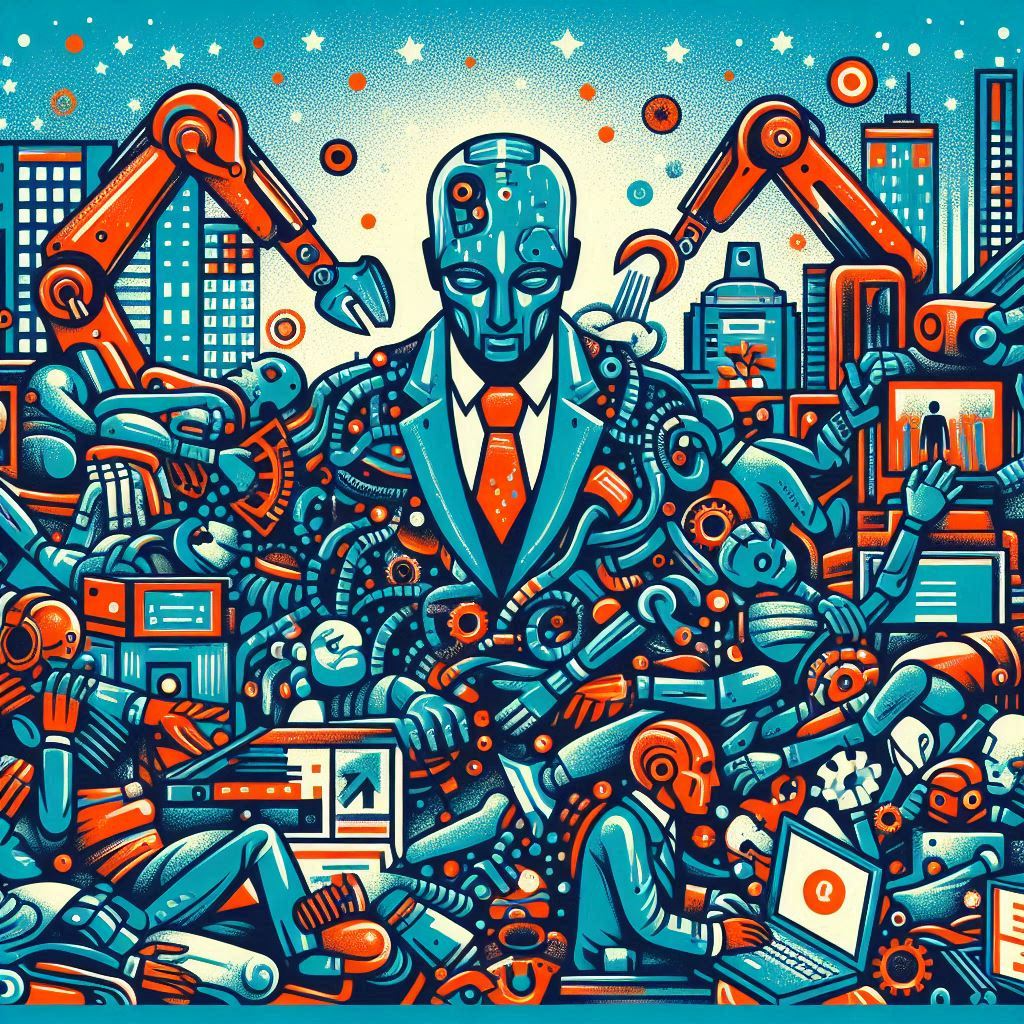How AI Advises Companies Just Like a Pro Consultant
Are you looking for expert advice to help your company make important decisions? Look no further than AI. Artificial intelligence is becoming increasingly adept at advising companies just like a professional consultant. With its ability to analyze vast amounts of data and provide insights, AI is revolutionizing the way businesses make strategic choices.
In this article, we’ll explore how AI is transforming the consultancy landscape and how it can provide valuable guidance to businesses of all sizes.
AI’s Role in Modern Consulting – What is AI’s Role in Consulting Today?
In today’s world of consulting advisory, artificial intelligence (AI) has become an increasingly popular tool, providing valuable insights and automating tedious tasks. For businesses, including the consulting industry, AI has become an essential part of their operations. The fusion of human intellect and AI has resulted in a mutually beneficial situation, as AI can process data faster and provide valuable insights. In contrast, human consultants retain their ability to build meaningful business relationships and possess emotional intelligence, which AI lacks.
As AI competes with traditional strategy consultancies, companies must strategize for self-disruption, mergers, acquisitions, and partnership models to stay resilient against potential disruptions. The transformative potential of AI across various industries, including independent management consulting, is eagerly awaited. Industry leaders anticipate AI will enhance consultants’ data-based projects, level the playing field for independent consultants, and increasingly define the role of independent management consultants with the continued advancement of AI.
The evolving role of AI is expected to optimize consultant research and data collection, revolutionize candidate sourcing, and assist independent management consultants by streamlining tasks and enabling them to focus on higher-value activities.
AI in Action: Changing the Way Consultants Work
AI Tools Transform Management Consulting

Integrating AI into the consulting industry has substantially transformed how businesses leverage data and insights. Artificial Intelligence in consulting has brought about a new era of automation, which has allowed for more efficient data analysis, forecasting, and decision-making processes.
AI’s ability to process and interpret large volumes of data has made it an invaluable resource for businesses making informed strategic decisions. For example, AI-powered platforms have streamlined candidate sourcing and assessment while also enhancing access to high-performing talent for consulting projects.
Moreover, AI is forecasted to influence the future of independent management consulting significantly. Industry leaders anticipate that AI will optimize efficient project management, shift toward more people-focused work, and stimulate a focus on higher-value activities. As a result, independent consultants can deliver higher-quality services, compete with traditional firms, and increase their fees by using AI tools equal to those available at larger firms.
The transformative potential of AI across various industries, including management consulting, is promising. As AI continues to advance and reshape the industry, the role of independent management consultants is expected to evolve, emphasizing ethical stewardship, continuous learning, and task optimization.
AI’s Role in Consulting Advisory – AI Helping Make Smarter Decisions

Artificial intelligence is revolutionizing the world of consulting advisory, offering valuable insights and automating tasks. While there is a prevailing fear that AI could replace human jobs, recent advancements have shown that a partnership between humans and machines can be mutually beneficial.
AI can process data and provide insights at an accelerated pace, automating repetitive tasks and enabling consultants to focus on more strategic aspects. However, it’s important to note that AI cannot replace the nuanced skills required to build meaningful business relationships and lacks the emotional intelligence and contextual reasoning that humans possess.
In the consulting industry, AI has the potential to impact client growth, project types, client mix, and consultant skills and fees. Industry leaders anticipate that AI will optimize consultant research and data collection, streamline service delivery, and increase consultants’ access to high-performing talent.
Thus, while AI is reshaping the nature of consulting work, it is not replacing human consultants but enhancing their capabilities. The future of consulting advisory lies in the collaboration between humans and AI, where each complements the other, leading to higher-quality services and a more streamlined approach to client projects.
AI Bots: Assisting Consultants in Data Collection and Time-Saving

In the modern consulting world, AI technology has become a valuable ally for consultants in gathering information and optimizing time management. AI bots, powered by artificial intelligence, can process vast amounts of data at high speeds, enabling consultants to access valuable insights and automate repetitive tasks. For instance, AI bots can swiftly analyze market trends, customer data, and financial information, allowing consultants to make data-driven decisions efficiently.
Furthermore, AI bots can streamline data collection processes, freeing consultants’ time to focus on more complex and creative tasks. By automating data gathering, consultants can dedicate more time to building meaningful client relationships and providing tailored human-centric solutions.
Understanding Big Data with AI and NLP in Consulting Advisory

In modern consulting advisory, the integration of AI and NLP (natural language processing) to understand big data has become invaluable. AI tools can process and analyze vast amounts of unstructured data, such as customer feedback, social media conversations, and market trends.
For example, AI and NLP can help generate insights from customer call transcripts, identify patterns and customer sentiment, and enable consultants to make data-driven recommendations.
Additionally, AI can automate data categorization and key information extraction, allowing consultants to focus on interpretation and strategy development. This transformative use of AI in big data analysis is reshaping the consulting advisory landscape, making it easier to derive meaningful insights and drive informed decision-making.
Why Consultants Like AI: The Big Pluses
Innovative Ways AI is Reshaping Consulting Advisory – Getting More Done, Spending Less Money
AI technology has gained widespread attention in the consulting industry as a tool for maximizing productivity while minimizing costs. Its capacity to provide valuable insights and automate repetitive tasks has made it an invaluable asset for consulting firms. Despite initial concerns that AI might replace human jobs, subsequent advancements show that collaboration between human consultants and machines can be mutually beneficial.
AI can process large data sets quickly, offering valuable insights that would take humans much longer to analyze and interpret. This can lead to substantial cost savings for consulting firms, allowing them to provide clients with more comprehensive and efficient services.
As a result, AI has the potential to level the playing field for independent consultants by providing them with tools on par with larger firms, enabling them to compete more effectively and potentially increase their fees.
While AI is transforming the nature of work in the consulting industry, it is essential to recognize that it cannot wholly replace human consultants’ nuanced skills and emotional intelligence. Trust, reputation, and the ability to build meaningful business relationships are areas where AI falls short compared to traditional consultancy services. Therefore, rather than fearing the disruptive potential of AI, consulting firms should seize the opportunity to improve human capabilities and adapt to technological advancements.
The role of independent management consultants is also evolving due to AI, which emphasizes people-focused and implementation-oriented work. This shift has the potential to streamline tasks and enhance project efficiency, allowing consultants to focus on higher-value activities. As AI advances, it is expected to reshape the consulting industry, providing tailored assistance to independent management consultants and ultimately improving the overall quality of services.
Optimizing Consulting with Real-Time Data – Making Quick, Smart Choices with Real-Time Data
Artificial Intelligence is making its mark in the consulting advisory industry, providing real-time data for better business decisions. AI’s ability to analyze large volumes of data quickly allows consultants to gain valuable insights and automate repetitive tasks. As businesses increasingly rely on AI, there are concerns about potential job displacement. However, the partnership between humans and AI presents an opportunity to enhance human capabilities rather than replace them.
Despite its advantages, AI lacks the nuanced skills necessary for meaningful human connections and contextual understanding. This makes it unable to replace traditional consultancy services fully. While AI can process data rapidly, human consultants are indispensable for emotional intelligence and building trust. Therefore, consulting firms should adopt self-disruption strategies, mergers, and partnership models to remain relevant and leverage AI’s potential.
The transformative potential of AI extends to various industries, including management consulting. Industry leaders anticipate AI augmenting access to talent, improving project efficiency, and shifting focus to more human-centric work. As AI advances, the role of independent management consultants is expected to be redefined, enabling them to concentrate on higher-value activities.
Fewer Mistakes, Less Bias. AI in Consulting Advisory
The fear of AI replacing human intellect has been a recurring theme throughout history, dating back to the first industrial revolution. However, the reality is that AI, particularly in the consulting industry, offers several benefits when used in collaboration with human consultants.
While AI can crunch data faster and provide valuable insights, human consultants still offer unique skills that AI lacks. For instance, AI lacks emotional intelligence and contextual reasoning, which are crucial in building meaningful business relationships and establishing client trust. Traditional consultancies are still the best option for small and medium businesses, as they may not have access to the same data or resources as larger organizations.
To succeed in the age of AI, consulting firms need to adopt self-disruption strategies, mergers and acquisitions, and partnership models. This approach can help reduce risks and increase resilience against disruption and technological advancements.
The world awaits AI’s transformative potential in various industries, including management consulting. Industry leaders predict a significant impact on independent management consulting due to AI, with the potential for enhanced services and increased fees for independent consultants. However, it is important to note that continuous learning and ethical stewardship in utilizing AI are paramount as AI becomes more prominent.
As AI advances, it is likely to reshape the consulting industry and redefine the role of independent management consultants, focusing more on higher-value and people-oriented activities.
Trusting AI for More Accurate Results
Despite the initial fears surrounding AI, it has proven to be a valuable tool in the consulting industry, providing more accurate and insightful results. AI’s ability to quickly and efficiently process large volumes of data makes it a critical asset in driving business strategies.
For example, AI can analyze market trends, customer behavior, and financial data to offer valuable insights and recommendations to consulting firms.
Moreover, AI can automate repetitive and time-consuming tasks, allowing consultants to focus on more critical aspects of their work. This increases efficiency and productivity, ultimately leading to more accurate results in consulting advisory services.
However, it is essential to note that while AI can provide accurate and data-driven insights, it cannot replace the nuanced skills of human consultants. AI lacks emotional intelligence, contextual reasoning, and the ability to build meaningful business relationships. Therefore, human consultants remain invaluable in providing the personalized touch and the human element that AI cannot replicate.
The Tough Parts of Using AI in Consulting
Worries About Robots Taking Jobs

Many people are worried about the impact of AI on the job market, including those in the consulting industry. Here’s why:
- AI has the potential to automate many tedious tasks, leading to concerns that it could end up displacing human jobs. Many fear businesses will become increasingly dependent on robots and machines, ultimately replacing human workers.
- Although AI can provide valuable insights and streamline specific processes, it lacks the emotional intelligence and contextual reasoning that humans possess. This is particularly crucial in the consulting industry, where building meaningful business relationships is essential.
- Traditional consultancies remain the best option for small and medium businesses that may not have access to the same data or resources as larger organizations. AI may not fully replicate the nuanced skills necessary for providing quality consulting services.
- Many industry leaders anticipate AI’s significant impact on independent management consulting. They also believe that AI will provide consultants with tools equal to those available at larger firms, potentially leveling the playing field and allowing for higher-quality services.
Keeping Data Safe and Private with AI
Keeping Data Secure and Private with AI in Consulting Advisory
AI has become an indispensable tool for companies in various industries, including consulting, due to its ability to provide valuable insights and automate tasks in the digital age. However, concerns about AI’s potential displacement of human jobs have emerged.
Despite these concerns, AI presents an opportunity for individuals and businesses when used in partnership with human consultants. While AI can process data rapidly and offer valuable insights, it lacks the emotional intelligence and contextual reasoning that human consultants possess.
In the consulting arena, traditional consultancies remain the best option for small and medium businesses that may not have access to the same data or resources as larger organizations. To navigate the disruptions caused by AI in the consulting industry, companies must adopt self-disruption strategies, mergers and acquisitions, and partnership models.
AI has the potential to revolutionize independent management consulting, providing consultants with tools equal to those available at larger firms and streamlining service delivery. As AI continues to evolve, it is likely to reshape the industry and redefine the role of independent management consultants.
AI and Human Interaction in Consulting Advisory. Can AI Replace the Human Touch?
While the rise of AI in consulting has raised concerns about the potential displacement of human jobs, it is important to recognize that AI cannot replace human consultants’ nuanced skills and expertise. In the digital age, AI has undoubtedly become an invaluable tool for businesses, providing valuable insights and automating tedious tasks. However, human consultants play an indispensable role when it comes to building meaningful business relationships, emotional intelligence, and contextual reasoning.
For instance, traditional consulting services provide small and medium businesses personalized attention and expertise that may not be readily available through AI. As AI continues to reshape the nature of work in the management consulting industry, industry leaders anticipate it will empower independent consultants and streamline tasks, allowing them to focus on higher-value activities.
Furthermore, companies must embrace self-disruption strategies and partnership models to stay relevant and keep up with technological advancements. The future of AI in consulting lies in a collaborative partnership between humans and machines, leveraging their unique strengths to deliver exceptional services to clients. As AI advances, it is likely to reshape the industry and redefine the role of independent management consultants.
The Cost of Incorporating AI in Consulting Advisory
Incorporating AI into the consulting advisory industry comes with its own set of costs and benefits. From a financial perspective, the initial investment in AI technology can be significant. This includes the cost of acquiring AI software and hardware and training consultants to use the new technology effectively. Companies also need to consider ongoing maintenance and updates and potential cybersecurity risks associated with AI implementation.
There is also a human cost to consider besides the financial costs. The fear of job displacement due to AI can create a sense of unease and anxiety among consultants. Additionally, the need to upskill and reskill the workforce to adapt to AI tools can be a significant investment for consulting firms.
On the flip side, the potential benefits of incorporating AI into consulting advisory can be significant. AI can automate tedious and time-consuming tasks, allowing human consultants to focus on more strategic and value-added activities. Additionally, AI has the potential to provide valuable insights and data-driven recommendations to improve the quality of consulting services.
AI and Jobs: How Workforces Stay Strong
The emergence of AI as a valuable tool in the consulting industry has raised concerns about its potential to displace human jobs. However, a closer examination reveals that AI can strengthen the workforce by augmenting human capabilities rather than replacing them. For example, AI can crunch data faster and provide valuable insights, but it cannot replace the nuanced skills necessary to build meaningful business relationships with people.
In practice, many industry leaders anticipate that AI will provide independent consultants with access to tools equal to those available at larger firms, allowing them to deliver higher-quality services. Additionally, AI is expected to optimize consultant research and data collection, improve project efficiency, and streamline tasks, enabling consultants to focus on higher-value activities.
Finding Special Ways, AI Can Help Consulting
AI’s Potential Benefits in Consulting:
- AI has the capability to process and analyze large amounts of data rapidly, providing valuable insights to consultants and their clients. For example, AI tools can help identify trends, patterns, and opportunities within complex data sets, enabling consultants to make informed recommendations based on accurate and up-to-date information.
- AI can automate routine and repetitive tasks, such as data entry and administrative work, freeing consultants’ time to focus on more complex and strategic issues. For instance, AI-powered chatbots can handle basic client inquiries, allowing consultants to concentrate on higher-value projects and client relationships.
- AI can enhance the accuracy and quality of decision-making in consulting. Using machine learning algorithms, AI can analyze vast amounts of data to identify potential risks, anticipate market changes, and make predictions based on historical patterns, ultimately supporting consultants in developing more effective strategies for their clients.
These examples demonstrate how AI can provide valuable support to the consulting industry. It can empower consultants to deliver higher-quality services and enable them to focus on tasks that require human expertise and interpersonal skills.
Use AI to Boost Your Consulting Business
The Benefits of AI for Consulting Business:
- AI provides valuable data insights and automates tedious tasks, improving efficiency in the consulting industry. For example, AI can analyze large data sets to identify trends, patterns, and potential opportunities, allowing consultants to make more informed decisions.
- Partnerships between humans and machines can create mutually beneficial situations for individuals and businesses. For instance, AI can handle data processing, leaving consultants more time to focus on building client relationships and providing personalized advice.
- AI can help consulting firms stay competitive and relevant by adopting self-disruption strategies, mergers and acquisitions, and partnership models to keep up with technological advancements. If implemented correctly, AI can reduce risk and increase resilience against disruption.
- AI will provide independent consultants with tools equal to those at larger firms, allowing them to deliver higher-quality services. For example, AI-powered platforms can improve consultants’ access to high-performing talent and streamline service delivery.
- AI is reshaping the nature of work in the consulting industry, altering how tasks are carried out and influencing the workforce. As AI becomes more prominent, continuous learning and ethical stewardship will be paramount for independent management consultants.
How Consultants Keep Up with the AI Trend
Self-Disruption: The Evolution of AI in Consulting.
The hesitancy around integrating artificial intelligence into the consulting industry is driven by the fear of job displacement and the idea of machines replacing human intellect. However, rather than signifying the end of human consultants, AI presents an opportunity to enhance their capabilities and enable a mutually beneficial partnership between humans and machines.
AI’s functionality in business, particularly in the consulting industry, offers valuable insights and process automation. Despite its potential benefits, concerns about job displacement resurface. Yet, the evolving role of AI demonstrates that a partnership model can promote collaborative synergy, benefiting both individuals and businesses.
AI may revolutionize the management consulting industry but cannot completely replicate the nuanced skills required for meaningful human-to-human connections, emotional intelligence, and contextual reasoning. Although AI offers rapid data processing and valuable insights, it does not replace the trust and reputation developed through traditional consulting services.
To navigate the changing landscape influenced by AI, consulting firms must adopt self-disruption strategies, mergers and acquisitions, and partnership models. The integration of AI should serve as an opportunity to increase human capabilities rather than diminish them. Ultimately, AI’s transformative potential will reshape the nature of work and alter the consulting industry, emphasizing the importance of continuous learning and ethical stewardship.
The progression of AI in independent management consulting augments access to talent and expertise, streamlines project efficiency, and reshapes independent consultants’ roles and work focus.
Joining Forces through Mergers
The consulting industry is experiencing a significant transformation due to the increasing adoption of AI. Concerns about AI displacing human jobs have sparked discussions about its role in the industry. However, rather than viewing AI as a threat, consulting firms are exploring opportunities to leverage AI and enhance their capabilities.
Mergers and acquisitions are emerging as a strategic approach for consulting firms to ride the AI wave. By joining forces with AI-powered platforms or other consulting firms with advanced technological capabilities, companies can increase their resilience against disruption and adapt to the evolving industry landscape. Practical examples include mergers between traditional consulting firms and AI startups or partnerships between established firms and AI technology providers.
These alliances enable companies to access cutting-edge technologies and data resources, facilitating the delivery of higher-quality services. Additionally, by combining human consultants’ nuanced skills with AI’s data-driven insights, firms can establish themselves as innovative leaders in the evolving AI-powered consulting advisory space.
Making Alliances for Smarter Consulting
Incorporating Artificial Intelligence into consulting practices is an opportunity to enhance human capabilities rather than replace them. For consultants, making alliances with AI can lead to mutual benefits. AI is capable of crunching data at a quicker pace and providing valuable insights.
In contrast, human consultants excel in areas where AI falls short, such as emotional intelligence, contextual reasoning, building meaningful relationships, and the ability to understand trust and reputation. Furthermore, AI stands to reshape the nature of work in the management consulting industry, altering how tasks are conducted and influencing the workforce.
Thus, consulting firms must be open to adopting self-disruption strategies, mergers, and partnership models to stay relevant and keep up with technological advancements. Industry experts predict that AI will revolutionize the role of independent management consultants by improving project efficiency and enabling them to focus on higher-value activities. As AI continues to evolve, it is expected to reshape the industry and redefine the role of independent management consultants, offering them tools equal to larger firms and allowing them to compete effectively in the ever-changing landscape.

Vizologi is a revolutionary AI-generated business strategy tool that offers its users access to advanced features to create and refine start-up ideas quickly.
It generates limitless business ideas, gains insights on markets and competitors, and automates business plan creation.


